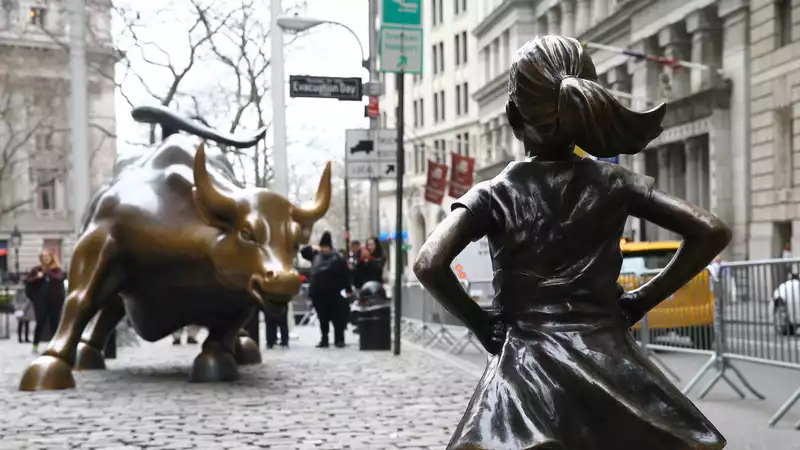Wall Street's time is up.
Happy New Year! I use quotation marks because, as anniversaries go, this is a more bittersweet celebration: time's up was launched on January 1, 2018. Founded by more than 300 women in entertainment with a mission to "advocate for a world where work is safe, fair, and dignified for women of all kinds," the organization began in late 2017 to address sexual harassment of women across a variety of industries and the resulting response to the #MeToo movement about workplaces that are unsafe for us.
The reckoning continues: in the two years since TIME'S UP was created, the list of leading executives ousted as a result of the movement now includes Les Moonves (former chairman and CEO of CBS) and casino magnate Steve Wynn. Some of the senior positions that have become vacant have been filled by women, such as Melissa Bell, who replaced Lockhart Steele as editor-in-chief of Vox Media, and Jennifer Salke, who took over as head of Amazon Studios after Roy Price's resignation.
Despite this progress, many challenges remain in the fight for safe workplaces, equal pay, and gender equality. The wage gap remains stubbornly large, with white women at 79% of white men, black women at 62%, and Hispanic women at only 54%. Only about 7% of Fortune 500 companies are led by female CEOs. Diversity in executive leadership has been slow to take hold.
In all of this, there is no real recognition or discussion of the role played by money: the wealth gap between men and women is both a root cause and a consequence of sexual harassment. Just as many women felt trapped in abusive work environments, sexist treatment put many out of work and negatively affected their earning power and wealth. More subtly, this behavior created a tone and environment in which women's contributions were almost certainly minimized, similarly affecting their ability to advance their careers and increase their personal wealth. This is a cycle.
Thus, it is perhaps not surprising that nowhere is the gender power imbalance more tilted than in the industry that represents money itself: Wall Street. In recent years, the number of people in this industry who have publicly lost their jobs because of #MeToo allegations can be counted on one hand. But let's consider why the #MeToo movement on Wall Street is so important.
First, an industry that is not diverse tends to build products and services for itself. It is no coincidence that men are more likely to work and invest their money in the financial industry than women. (This is also why we founded Ellevest, Inc. for and by women.)
Second, we know that less diverse teams tend to take on more risk than heterogeneous teams, and research confirms this. We also know that the people who occupied the trading desks on Wall Street leading up to the 2008 financial crisis were very undiverse. In other words, if more women and minorities had worked on Wall Street, the financial crisis might not have been as bad. Or, more accurately, the financial crisis might not have been as bad as it was.
So why isn't there a #TimesUp movement on Wall Street? Nearly 60% of female financial advisors say they have personally experienced sexual harassment in the workplace, and nearly 80% of industry professionals believe sexual harassment is a problem.
However, the problem remains hidden because most companies have historically required employees to sign mandatory arbitration agreements. The problem has been compounded by the fact that many women and men have been subjected to sexual harassment by their employers, i.e., older white men, those who grew up in the same industry that attends the Three Martini Lunch, and generally those who have never experienced sexual harassment themselves. While some women persevered and filed harassment complaints, many were simply kicked out of the company and found it difficult, if not impossible, to find other work.
When I was on Wall Street, I saw many times when a junior woman accused a more senior (read: powerful and revenue-generating) man of harassment, the first step was to put together a financial offer that would get her out quickly and easily. Only after that was an investigation of the accuser, and "stern talking down" was usually the extent of the "punishment."
Moreover, the industry, which has historically created an environment where women are forced to compete with each other, both between firms and within firms, with few senior seats for women. On Wall Street, there was a culture in which outsiders were the "enemy," and there was little room for cooperation in business between firms. Worse, the same thing has happened within companies, where female employees have unfortunately internalized the notion that only a few women can succeed. For you to get your shot, another woman has to leave, and for another woman to get her shot, you have to leave.
The result: ...... There are some great women in this industry who lead other women, and some who don't. Progress has been slow and even glacial for a long time, as there are few senior positions available for women to begin with.
And finally, let's face it: the clients of these companies don't care about these issues and have simply moved their business elsewhere. Ken Fisher, CEO of investment management firm Fisher Investments and a "self-made billionaire," made vile remarks at the October 2019 Financial Services Conference, talking about genitals and comparing winning in the asset management business to "getting in a girl's pants." His remarks were followed by a series of announcements that business was being pulled from his firm. A few weeks later, the company was actually larger than before because other firms added to the business done with his company. After only a few weeks. There is no market mechanism that can force a meaningful cultural change.
However.
"What if 2020 is the year we women decide to stop supporting companies and organizations that have not supported us, as a very powerful woman once told me.
As women, we control over 80% of consumer spending and trillions of dollars of wealth. Maybe not as much as men, but we control trillions of dollars of wealth. We can shift this power if we use money as leverage, such as buying from women-owned businesses and not doing business with companies that do not reflect us.
Sally Krawcheck is the CEO and co-founder of Ellevest, a digital-first, mission-driven investment platform for women and one of Entrepreneur magazine's Top 100 Brilliant Ideas. Prior to launching Ellevest, Krawcheck had a successful career on Wall Street: he served as CEO of Merrill Lynch and CFO of Citigroup.
For more stories like this, including celebrity news, beauty and fashion advice, savvy political commentary, and fascinating features, sign up for the Marie Claire newsletter.
Click here to register (opens in new tab)
.






Comments